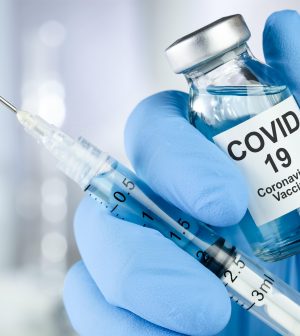- Could Artificial Sweeteners Be Aging the Brain Faster?
- Techniques for Soothing Your Nervous System
- Does the Water in Your House Smell Funny? Here’s Why
- Can a Daily Dose of Apple Cider Vinegar Actually Aid Weight Loss?
- 6 Health Beverages That Can Actually Spike Your Blood Sugar
- Treatment Options for Social Anxiety Disorder
- Understanding the Connection Between Anxiety and Depression
- How Daily Prunes Can Influence Cholesterol and Inflammation
- When to Take B12 for Better Absorption and Energy
- Epsom Salts: Health Benefits and Uses
FDA Panel Supports Tweaked Booster Shots From Moderna, Pfizer This Fall

A U.S. Food and Drug Administration advisory panel recommended on Tuesday that updated COVID-19 booster shots be used this fall to protect against Omicron and its highly contagious subvariants.
Because the virus mutates so quickly, the FDA may approve the new vaccine formulations, since COVID-19 cases are expected to surge again this winter. Tuesday’s advisory panel approval speeds the process by which FDA regulators will push for updated booster formulations.
According to the New York Times, the panel discussed various formulations of the Pfizer-BioNTech and Moderna vaccine boosters as possible candidates, but did not decide on which might work best. The agency has been leaning towards a combination of the existing COVID-19 vaccine and one targeting two Omicron subvariants, BA.4 and BA.5, the Times reported.
CDC data now show those subvariants together making up half of all new infections in the United States.
Manufacturers must work “very rapidly” to produce reformulated shots that would be ready for an autumn rollout, Dr. Peter Marks, head of the FDA’s vaccine division, told the Times. mRNA vaccines — the types produced by Pfizer and Moderna — typically take about three months to produce doses of any reformulated shots.
Given how fast the virus changes, lengthy human trials may have to be abandoned in favor of more laboratory tests and animal tests, the Times added. That’s because human trials can take up to five months, which can make the vaccine obsolete before it’s even released to the public.
Both Pfizer and Moderna have been testing updated booster shots that target the Omicron variant, with early trial results showing the tweaked shots boost protection against Omicron. But since then, subvariants of Omicron have surfaced and are spreading.
“Omicron is clearly in the rearview mirror,” Dr. Peter Hotez, a vaccine expert with Baylor College of Medicine in Houston, told the Times. An Omicron booster isn’t necessary unless it works against the newest Omicron subvariants, but “I haven’t seen evidence of that,” he said.
Even the FDA said in a briefing document prepared for the advisory committee meeting that the bivalent booster targeting both the original virus and Omicron is “already somewhat outdated.”
But Dr. Kelly Moore, president of Immunize.org, a nonprofit that works to increase vaccine rates, told the Times that an accelerated process is already used to update the flu vaccine each year.
Although this is the first time the process would be used with COVID vaccines, they have been safely given to hundreds of millions of people, she noted.
Updating them might call for “very well-educated guesswork,” she said, that is “appropriate for the circumstances.”
Still, the chance exists that the virus will change again and make the updated vaccines ineffective.
Dr. John Beigel, a clinical research director at the U.S. National Institutes of Health, told the Times, “They [the new vaccines] may be old news by the time the fall comes.”
Beigel said one option is to stick with the existing vaccines, which continue to provide robust protection against severe disease, while offering very little protection against infection.
In any event, a broad swath of the population will be offered booster shots, said Dr. Arnold Monto. He’s a public health professor at the University of Michigan who chairs the FDA advisory panel.
“We know there’s waning. We have to boost, and it’s better to boost with something more relevant” than the existing vaccines, Monto told the Times.
But Dr. Paul Offit, a vaccine expert at Children’s Hospital of Philadelphia and a member of the FDA advisory panel, countered that idea.
“Hospitalizations are down. Deaths are way down because we are protected against serious illness. That’s what matters,” Offit told the Times. Only those over 70, and those over 50 with serious underlying conditions, will likely need a fall booster shot because COVID can have serious consequences for these people, Offit believes.
More information
Visit the U.S. Centers for Disease Control and Prevention for more on COVID vaccines.
SOURCE: New York Times
Source: HealthDay
Copyright © 2026 HealthDay. All rights reserved.










